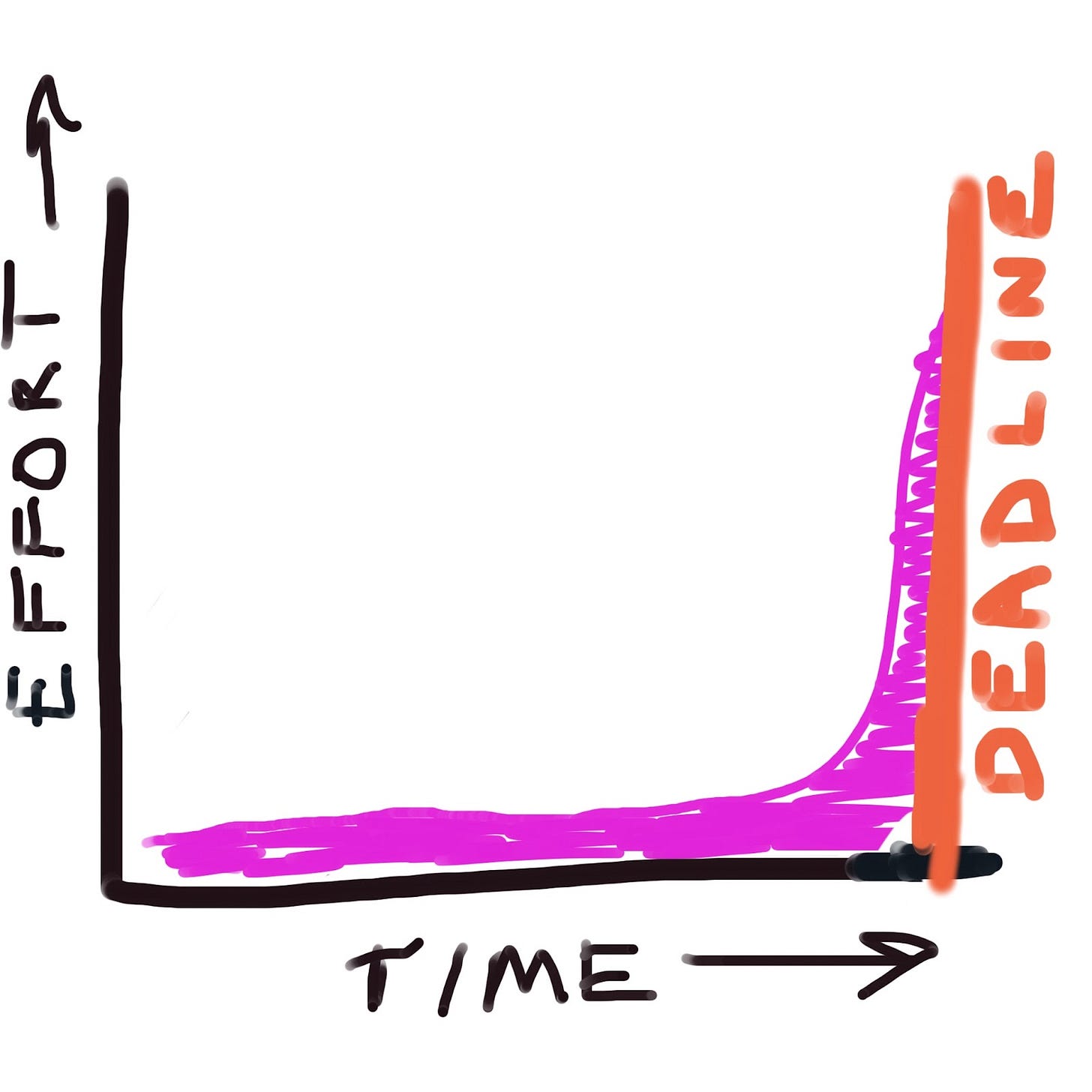Parkinson’s Law
“Don’t be afraid to take that first step.”
~ Muhammad Ali
Our kitchen table is covered in clutter.
We clean it off in the morning. And when we come home at night, we wonder how it got so cluttered again. Maryrose says that our dog Ollie has secret parties when we go out.
My desk suffers this fate as well. I clean it off. Then before I know it, Ollie has covered it in books and papers.
No matter how big the surface is at our house, it will get filled with stuff.
The same is true with time. However long I have to do a project doesn’t matter. Give me a day, a week, or a month – and that’s how long I’ll take.
Our clients have this problem too. There are always a few each week who scramble to finish their homework before we meet. They may have had a month to practice, but they wait until the last moment before our sessions begin.
In the 1950s, the British historian Northcote Parkinson wrote a famous essay for The Economist magazine where he described an old lady who takes an entire day to send a postcard. The moral of the story, he says, is that “work expands so as to fill the time available for its completion.”
The adage is known today as Parkinson’s Law.
Everywhere you look, you’ll see it in action. Financial advisors help us overcome it with principles like “pay yourself first” and “spend less than you earn.” Decluttering gurus promise us life-changing magic in tidying up.
There are seemingly endless examples:
Meetings drone on to fill the time allotted.
Coffee consumption expands until the project is done.
Doomscrolling continues until all leisure time is exhausted.
The complexity of jargon grows to fill the speaker’s uncertainty.
Pre-speech jitters expand to consume the entire morning.
Bureaucracy swells until all resources are devoured.
Coaches of all fields, from music to sports to leadership and communication, teach us to avoid Parkinson’s Law. The truth is, when it comes to allocating our time, many of us treat projects like this:
We procrastinate as long as possible and then scramble just before the deadline. For projects with no deadline – say to lose weight, learn to play the fiddle, or become a clear and confident speaker – this can mean never getting around to making progress.
Why do we succumb to Parkinson’s Law?
We all work hard to avoid negative feelings. We often think that practice will be boring or difficult, so we avoid it. Public speaking is particularly easy to hide from since it can also make us feel anxiety and fear.
According to psychologist Timothy Pychyl, to overcome Parkinson’s Law we should “just get started.” We don’t have to wait until we feel good. Rather we will come to feel good after we make even a tiny amount of progress.
Just get started: Block your calendar right now.
I’ve worked with several executives who spent years, sometimes even decades, avoiding public speaking at all costs. But once they get used to practicing, they come to enjoy and feel empowered by it. Practice reduces anxiety and fear. The more we practice, the more we build confidence.
How do you get started? Block your calendars.
Researchers at Harvard University show that simply blocking your calendar is a powerful way to change behavior and make progress. We are more likely to do the things that we schedule. These little deadlines spur action and effort.
Even grabbing one 15-minute slot a week to dedicate to practice will have a positive impact. Over time, you’ll see improvement:
Ask yourself, what is one thing you want to get better at in 2024?
It could be storytelling, speaking confidently, learning Spanish, or anything else. Take a moment right now and block your calendar. Start small. Just block one 15-minute practice session within the coming week. You don’t have to know exactly what you’re going to do. Don’t let perfect be the enemy of the good.
Just get started.
To overcome fears and obstacles, we have to face them. And that begins with small scheduled commitments. Once our calendars are set, we are less likely to be pulled off track – even by saboteurs like Ollie.
And with enough practice and time, progress is inevitable.







